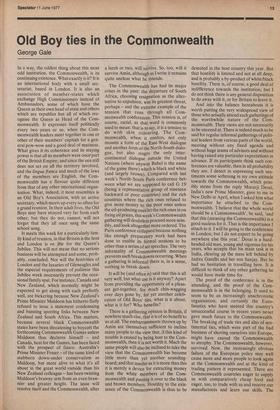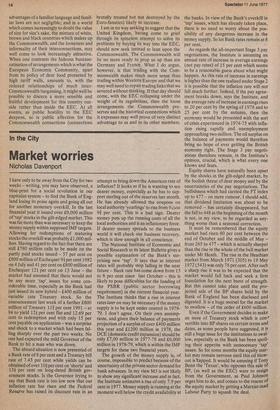Old Boy ties in the Commonwealth
George Gale
In a way, the oddest thing about this most odd institution, the Commonwealth, is its continuing existence. What exactly is it? It is an international body with a small secretariat, based in London. It is also an association of member-states which exchange High Commissioners instead of Ambassadors, some of which have the Queen as their own head of state and others which are republics but all of which recognise the Queen as Head of the Commonwealth. It expresses itself politically every two years or so, when The Commonwealth leaders meet together in one or other of their members' capitals for a general pow-wow and a good deal of matiness. What gives it its coherence and its staying power is that all its members were once-part of the British Empire; and since the sun still does not set on all the territory involved, and the lingua franca and much of the laws of the members are English, the Commonwealth has a flavour quite different from that of any other international organisation. What, indeed, it most resembles is an Old Boy's Association, with an active secretary, which meets up every so often for a grand reunion. In their adult lives, the Old Boys may have strayed very far from each other; but they do not, cannot, will not forget that they all once sang the same school song. It meets this week for a particularly family kind of reunion, in that Britain is the host and London is en fête for the Queen's Jubilee. This will not mean that no serious business will be attempted and some, probably, concluded. Nor will the festivities of London and the luxuries of Gleneagles and the especial requirements of politesse this Jubilee week necessarily prevent the occasional family spat. For instance, Canada and New Zealand, which normally might be expected to get along with each perfectly well, are bickering because New Zealand's Prime Minister Muldoon has hitherto flatly refused to issue a statement condemning and banning sporting links between New Zealand and South Africa. This matters, because several black Commonwealth states have been threatening to boycott the forthcoming Commonwealth Games unless Muldoon thus declares himself — and Canada, host for the Games, has been faced with the prospect of fiasco. Australia's Prime Minister Fraser — of the same kind of stubborn down-under conservatism as Muldoon, but more alive to what it's all about in the great world outside than his New Zealand colleague — has been twisting Muldoon's brawny arm from an even brawnier and greater height. The issue will resolve itself and the Commonwealth, after
a lurch or two, will survive. So, too, will it survive Amin, although as I write it remains quite unclear what he intends.
The Commonwealth has had its major crises in the past: the departure of South Africa, choosing resignation as the alternative to expulsion, was its greatest threat, perhaps — and the extreme example of the tension that runs through all Commonwealth conferences. This tension is, of course, racial, as that word is commonly used to mean: that is to say, it is a tension to do with skin colouring. The Commonwealth, when it confers, not only mounts a form of the East-West dialogue and another form of the North-South dialogue, but also stages the only intercontinental dialogue outside the United Nations (where anyway Babel is the name 'of the game there) which is black and white (and largely brown). Compared with last week's North-South Paris conference between what we are supposed to call G 19 (being a representative group of nineteen backward or poor countries) and the rich countries where the rich ones refused to give more money to the poor ones unless the oil-producing ones let the rich ones in on fixing oil prices, this week's Commonwealth gathering will doubtless proceed more sensibly, and look altogether more ordered. The Paris conference collapsed because nothing like enough preparatory work had been done to enable its formal sessions to be other than a series of set speeches. The very informality of Commonwealth meetings prevents such breakdowns occurring. When a gathering is informal there is, in a sense, nothing to break down.
It will be (and often is) said that this is all very well, but what use is it anyway? Apart from providing the opportunity of a pleasant get-together, for much chin-wagging over days gone by, for yet another celebration of Old Boys' ties, what is it about, what is it for? Who benefits?
There is a gathering opinion in Britain, if nowhere much else, that it is of no benefit to us at all. The embarrassments thrown up by Amin are themselves sufficient to incline many people to the view that, if this kind of trouble is caused by being host to the Commonwealth, then it is not worth it. Much the same people will also be inclined to take the view that the Commonwealth has become little more than yet another soundingboard; and that insofar as it is more than this it is merely a device for extracting money from the white members of the Commonwealth and passing it over to the black and brown members. Hostility to the existence of the Commonwealth is thus to be detected in the host country this year. But that hostility is limited and not at all deep, and is probably ,a by-product of white/black hostility. There is, of course, a good deal of indifference towards the institution; but I do not think there is any general disposition to do away with it, or for Britain to leave it.
And into the balance hereabouts it is worth putting the very widespread view of those who actually attend such gatherings of the worthwhile nature of the Commonwealth. Their views are not necessarily to be sneezed at. There is indeed much to be said for regular informal gatherings of political leaders from various parts of the world, meeting without any fixed agenda and without huge teams of advisors and without having raised any particular expectations in advance. If its participants think such conferences are valuable, then in all probability they are. I detect in expressing such sentiments some softening in my own attitude towards the Commonwealth, which possibly stems from the reply Morarji Desai, India's new Prime Minister, gave to me in New Delhi in April, when I asked him what importance he attached to the Commonwealth. 'I believe that the whole world should be a Commonwealth', he said, 'and That this (meaning the Commonwealth) is a good nucleus for it. That is the importance I attach to it. I will be going to the conference in London; but I do not expect to be going anywhere else this year,' Desai is a hardheaded old man, young and vigorous for his years, who accepts that his main task is in India, clearing up the mess left behind by Indira Gandhi and her son Sanjay. But he had no hesitation in travelling here. It is difficult to think of any other gathering he would have made time for.
The proof of the conference is in the attending, and the proof of the Commonwealth is in the belonging. It used to seem to be an increasingly anachronistic organisation; and certainly the Eurofanatics who have steered this country's unsuccessful course in recent years never gave much future to the Commonwealth. The breaking of trade ties and also of sentimental ties, which were part of the bad business of shoving ourselves into Europe, might have caused the Commonwealth to atrophy. The Commonwealth, however, survived. Now, the increasingly obvious failure of the European policy may well cause more and more people to look again at the Commonwealth and at the kind of trading pattern it represented. There are Commonwealth countries eager to supply us with comparatively cheap food and eager, too, to trade with us and receive our manufactures and learn our skills. The advantages of a familiar language and familiar laws are not negligible; and in a world which comes increasingly to doubt the value of size for size's sake, the mixture of white, brown and black countries which makes up the Commonwealth, and the looseness and informality of their interconnections, may well come to look increasingly attractive. When one contrasts the hideous bureaucratisation of arrangements which is what the European Economic Community, apart from its policy of dear food protected by high tariff walls, amounts to, with the relaxed relationships of much interCommonwealth bargaining, it might well be possible to discern a more sensible and fruitful development Tor this country outside rather than inside the EEC. At all events, as public hostility to the EEC deepens, so is public affection for the Commonwealth connections (connections brutally treated but not destroyed by the Euro-fanatics) likely to increase.
I am in no way seeking to suggest that the United Kingdom, having come to grief through its spineless attempt to solve its problems by buying its way into the EEC, should now seek instead to lean upon the Commonwealth. The Commonwealth will be no more ready to prop us up than are Germany and France. What I do argue, however, is that trading with the Commonwealth makes much more sense than trading within Western Europe and that we may well need to repair trading links that we severed without thinking. If that day should come, with the EEC collapsing under the weight of its regulations, then the loose arrangements the Commonwealth preserves and the historical connections which it expresses may well prove of very distinct advantage to us and to its other members.



































 Previous page
Previous page